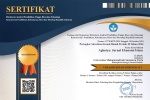Peluang dan Tantangan Financial Technology (Fintech) dalam Sistem Pembayaran Berbasis QRIS Pada UMKM di Kecamatan Medan Kota
Abstract
This study aims to determine the opportunities and challenges of Financial Technology (Fintech) in a QRIS-based payment system for MSMEs in Medan Kota District. The research method used in this study is a descriptive qualitative research method with an empirical approach. The results of research on 30 UMKM show that Fintech Opportunities in a QRIS-based payment system create sales revenue for MSMEs through collaboration with Fintech in a QRIS-based payment system which can market these products to E-commerce that has collaborated such as Grab, Gojek, Shopeefood and other. This QRIS payment is very practical, with one scan, the payment process has been completed and is done with only one barcode. Its strengths are facilitating service access, facilitating transactions, avoiding counterfeit money, no need to provide cash and automatic recorded transactions. Meanwhile, the challenges of Fintech in the QRIS-based payment system with current technological developments have made the community meet their daily needs with all-digital means and help SMEs in marketing their products online. However, there is still a lack of understanding in the use of these technologies which is one of the problems in this progress. As for the number of technological crimes that make users more vigilant. For MSMEs, the existence of QRIS payments is very beneficial for them, but it is weighed down by the admin fees that are borne by merchants not borne by consumers, called the MDR (Merchant Discount Rate) of 0.7%. The weakness is that it depends on the internet network and smartphone ownership which is not evenly distributed for the whole community.
Full Text:
PDFReferences
Abdillah. 2019. An Overview of Indonesian Fintech Application. The 1st International Conference on Communication, Information Technology and Youth Study (I-CITYS2019) (Figure 1):816.
Danuri, Muhamad. 2019. PERKEMBANGAN DAN TRANSFORMASI. 11623.
Luckandi, Diardo. 2019. Analisis Transaksi Pembayaran Menggunakan Fintech Pada UMKM Di Indonesia: Pendekatan Adaptive Structuration Theory. Jiko - Stmik Akakom Yogyakarta 4(1):186.
Miswan, Ansori. 2019. Perkembangan Dan Dampak Financial Technology (Fintech) Terhadap Industri Keuangan Syariah Di Jawa Tengah. Wahana Islamika: Jurnal Studi Keislaman 5(1):38.
Muhammad, Helmi, and Niki Puspita Sari. 2020. Pengaruh Financial Technology Terhadap Perbankan Syariah: Pendekatan ANP-BOCR (The Influence of Financial Technology on Islamic Banking: ANP-BOCR Approach). Perisai : Islamic Banking and Finance Journal 4(2):11325. doi: 10.21070/perisai.v4i2.868.
Tarantang, Jefry, Annisa Awwaliyah, Maulidia Astuti, and Meidinah Munawaroh. 2019. Perkembangan Sistem Pembayaran Digital Pada Era Revolusi Industri 4.0 Di Indonesia. Jurnal Al-Qardh 4(1):6075. doi: 10.23971/jaq.v4i1.1442.
Wiyono, Gendro, and Kirana. 2020. Efek Impresi Fintech Terhadap Perilaku Keuangan Usaha Kecil Menegah (UKM). Jurnal Ilmiah Manajemen Dan Bisnis 21(1):6981. doi: 10.30596/jimb.v21i1.3889.
Yarli, Dodi. 2018. Analisis Akad Tijarah Pada Transaksi Fintech Syariah Dengan Pendekatan Maqhasid. YUDISIA : Jurnal Pemikiran Hukum Dan Hukum Islam 9(2). doi: 10.21043/yudisia.v9i2.4766.
DOI: https://doi.org/10.30596/aghniya.v4i2.11734
Refbacks
- There are currently no refbacks.
Aghniya: Jurnal Ekonomi Islam is licensed under a Creative Commons Attribution-ShareAlike 4.0 International License.
Aghniya: Jurnal Ekonomi Islam
Faculty of Islamic Religion,Universitas Muhammadiyah Sumatera Utara. Address: Kampus Utama Jl. Kapten Muchtar Basri No.3, Glugur Darat II,Medan Sumatera Utara-20238.
E-mail: aghniya@umsu.ac.id





